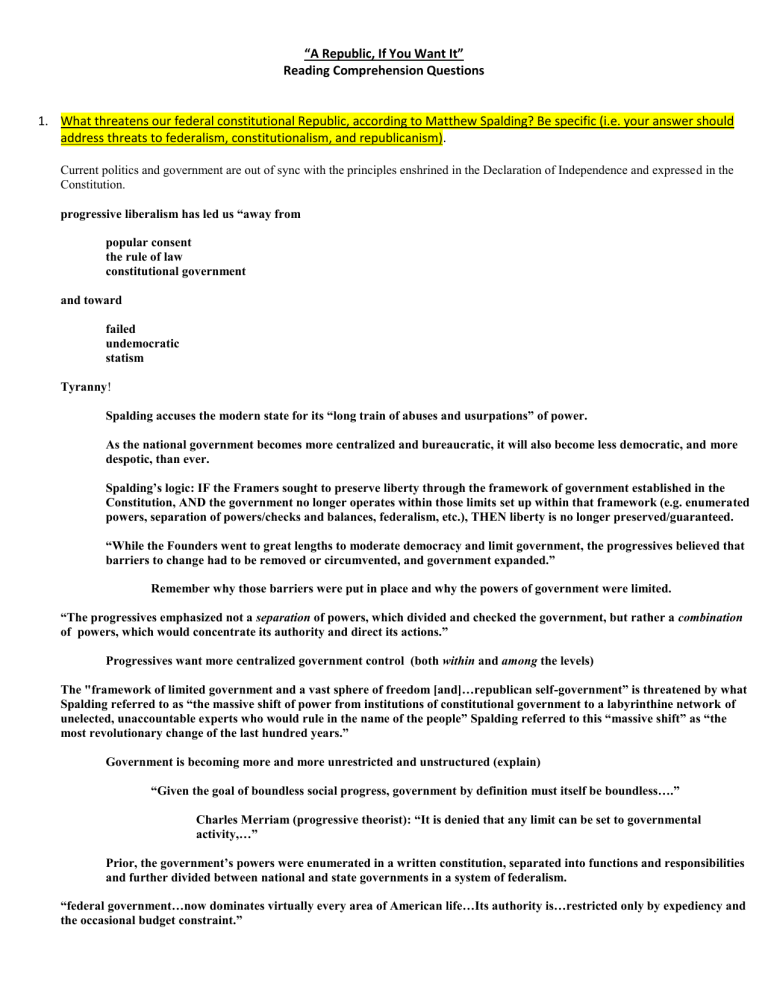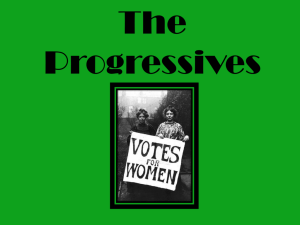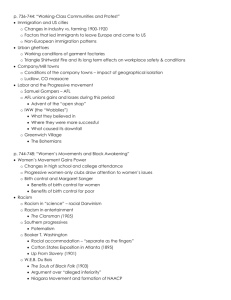“A Republic, If You Want It” Reading Comprehension Questions

“A Republic, If You Want It”
Reading Comprehension Questions
1.
What threatens our federal constitutional Republic, according to Matthew Spalding? Be specific (i.e. your answer should address threats to federalism, constitutionalism, and republicanism).
Current politics and government are out of sync with the principles enshrined in the Declaration of Independence and expressed in the
Constitution. progressive liberalism has led us “away from popular consent the rule of law constitutional government and toward failed undemocratic statism
Tyranny !
Spalding accuses the modern state for its “long train of abuses and usurpations” of power.
As the national government becomes more centralized and bureaucratic, it will also become less democratic, and more despotic, than ever.
Spalding’s logic: IF the Framers sought to preserve liberty through the framework of government established in the
Constitution, AND the government no longer operates within those limits set up within that framework (e.g. enumerated powers, separation of powers/checks and balances, federalism, etc.), THEN liberty is no longer preserved/guaranteed.
“While the Founders went to great lengths to moderate democracy and limit government, the progressives believed that barriers to change had to be removed or circumvented, and government expanded.”
Remember why those barriers were put in place and why the powers of government were limited.
“The progressives emphasized not a separation of powers, which divided and checked the government, but rather a combination of powers, which would concentrate its authority and direct its actions.”
Progressives want more centralized government control (both within and among the levels)
The "framework of limited government and a vast sphere of freedom [and]…republican self-government” is threatened by what
Spalding referred to as “the massive shift of power from institutions of constitutional government to a labyrinthine network of unelected, unaccountable experts who would rule in the name of the people” Spalding referred to this “massive shift” as “the most revolutionary change of the last hundred years.”
Government is becoming more and more unrestricted and unstructured (explain)
“Given the goal of boundless social progress, government by definition must itself be boundless….”
Charles Merriam (progressive theorist): “It is denied that any limit can be set to governmental activity,…”
Prior, the government’s powers were enumerated in a written constitution, separated into functions and responsibilities and further divided between national and state governments in a system of federalism.
“federal government…now dominates virtually every area of American life…Its authority is…restricted only by expediency and the occasional budget constraint.”
Government has become more actively involved in day-to-day American life.
In sharp contrast to its original character and scope—it was “once limited to certain core functions….”
Congress no longer engages in “serious” deliberation; nor is our government transparent/accountable/responsive to the people.
“Although the Constitution vests legislative powers in Congress, the majority of “laws” are promulgated in the guise of
“regulations” by bureaucrats who are mostly unaccountable and invisible to the public….”
“The national legislature is increasingly a supervisory body overseeing a vast array of administrative policymakers and rulemaking agencies….”
“Today, many policy decisions that were previously the constitutional responsibility of elected legislators are delegated to faceless bureaucrats whose “rules” have the full force and effect of laws passed by Congress.”
“ Americans are wrapped in an intricate web of government policies and procedures….businesses, organizations, and individuals…are subject to escalating federal regulations”
“Liberty no longer would be a condition based on human nature and the exercise of God-given natural rights, but a changing concept whose evolution was guided by government.”
“States, localities, and private institutions are submerged by national programs. The states…increasingly administer policies emanating from Washington….”
“ This bureaucracy has become so overwhelming that it’s not clear how modern presidents can fulfill their constitutional obligation to “take care that the laws be faithfully executed.”
The executive administration is “supposedly” under executive control.
Federal character of the Union undermined by 17 th Amendment (direct election of U.S. Senators)
It was Alexis de Tocqueville who first pointed out the potential for a new form of despotism in such a centralized, egalitarian state: It might not tyrannize, but it would enervate (cause someone to be drained of energy) and extinguish liberty by reducing self-governing people “to being nothing more than a herd of timid and industrious animals of which the government is the shepherd.”
2.
How and why did the modern state develop in both theory and practice in the United States? Trace its origin and development.
Theory/concept :
Thomas Hobbes : wanted to replace the old order with an all-powerful “Leviathan” that would impose a new order
Jean-Jacques Rousseau : to achieve absolute equality favored an absolute state that would rule over the people through a vaguely defined concept called the “general will.”
“The Americanized version of the modern state was born in the early 20th century.”
American “progressives,” under the spell of German thinkers, decided that advances in science and history had opened the possibility of a new, more efficient form of democratic government, which they called the “administrative state.”
“The objective of progressive thinking , which remains a major force in modern-day liberalism, was to transform America
FROM a decentralized, self-governing society INTO a centralized, progressive society focused on national ideals and the achievement of “social justice.”
Sociological conditions would be changed through government regulation of society and the economy; socioeconomic problems would be solved by confiscation and redistribution of wealth and benefits.
CONCEPT KNOWN AS SOCIAL ENGINEERING
THE MODERN STATE DID NOT DEVELOP OVERNIGHT
Incrementalism :
“Politics came to be seen as the ebb and flow between periods of “progress” and “change,” on one hand, and brief interregnums to defend and consolidate the status quo, on the other.
Woodrow Wilson’s view :
Wrote in 1912:
“ Some citizens of this country have never got beyond the Declaration of Independence, All that progressives ask or desire is permission—in an era when ‘development,’ ‘evolution,’ is the scientific word—to interpret the Constitution according to the Darwinian principle; all they ask is recognition of the fact that a nation is a living thing and not a machine.”
Charles Merriam (progressive theorist):
“ The modern idea as to what is the purpose of the state has radically changed since the days of the ‘Fathers,…because the exigencies of modern industrial and urban life have forced the state to intervene at so many points where an immediate individual interest is difficult to show, that the old doctrine has been given up for the theory that the state acts for the general welfare. It is not admitted that there are no limits to the action of the state, but on the other hand it is fully conceded that there are no ‘natural rights’ which bar the way. The question is now one of expediency rather than of principle.”
“ The Left has long maintained that the administrative state is inevitable, permanent, and ever-expanding—the final form of ‘democratic’ governance….
”
Practice :
Progressive platform (under TR and Woodrow Wilson) :
The platform “set forth…modern liberalism” which seeks to “refound America according to ideas that were alien to the original Founders….”
This intellectual construct began to attain political expression with targeted legislation :
Pure Food and Drug Act
Clayton Anti-Trust Act
16 th Amendment (federal income tax)
17 th Amendment (direct election of U.S. Senators)
The trend continued under the New Deal .
FDR (1932):
“The day of the great promoter or the financial Titan, to whom we granted everything if only he would build, or develop, is over….The day of enlightened administration has come.”
The First New Deal (1933-34)
Bank Holiday
Roosevelt shuts down all banks in the country by executive order in order to buy time to find a legislative solution to the banking crisis
Emergency Banking
Act
Federal Deposit
Insurance Corporation
The federal government lends money to banks in shaky financial condition in order to stem the banking crisis
A government-sponsored insurance program guaranteeing the security of depositors' funds in member banks
Home Owners Loan
Corporation
Civilian Conservation
Corps
A government lending agency which attempted to save people's homes by refinancing mortgages and deferring or spreading out mortgage payments
A government employment program whereby unemployed young men were put to work on reforestation and conservation projects
AgriculturalAdjustment
Act
FDR's attempt to solve the problem of overproduction of crops and resulting depressed crop values. Farmers who agreed to limit their acreage in production in line with a national plan to drive up agricultural prices would receive monetary payments from the government.
Federal Emergency
Relief Act
A system of federal relief or welfare payments to the needy funneled through the individual states
Tennessee Valley
Authority
Securities & Exchange
Commission
A multi-purpose agency in the Tennessee River
Valley that used government funds to construct and operate a series of hydroelectric dams.
A governmental regulatory commission to regulate the securities markets
Public Works
Administration
National Recovery
Administration
A government-lending program designed to lessen unemployment by lending funds for the construction of various structures by other government entities throughout the country.
An attempt to stimulate industrial recovery through centralized planning on a cooperative basis by management, labor, and government economists.
The Second New Deal (1935-36)
Works Progress
Administration
Wagner Labor
Relations Act
Wealth Tax Act
Public Utilities
Holding Co. Act
An immense government employment program to build roads, airports, etc. WPA personnel also wrote books, painted art, staged plays, etc.
Attempted to equalize the power of big business by giving government support to unionization. The act guaranteed the rights of collective bargaining by a union chosen by workers.
Instituted slightly higher income tax levels on upper income groups as well as corporate income taxes
Outlawed the pyramiding of control of gas and electricity companies and gave various federal commissions the power to strictly regulate the rates and financial practices of these companies
Rural
Electrification Act
Lent funds to rural communities and cooperatives to either manufacture or buy electricity and construct transmission lines to electrify rural areas of the country
Social Security
Act
Co-opting the Townsend Plan, the law created a government sponsored old-age and survivors insurance plan as well as a federal-state plan of unemployment insurance
Although most of FDR’s programs were temporary and experimental, they represented an expansion of government unprecedented in American society.
The Supreme Court’s late-1930s endorsement of the new “living” Constitution also represented an expansion of government unprecedented in American society.
FDR called for a “ Second Bill of Rights ” that would “assure us equality in the pursuit of happiness.” Roosevelt held that the primary task of modern government is to alleviate citizens’ want by guaranteeing their economic security. The implications of this redefinition are incalculable, since the list of economic “rights” is unlimited. It requires more and more government programs and regulation of the economy—hence the welfare state—to achieve higher and higher levels of happiness and well-being.”
Great Society :
The administrative state took off in the mid-1960s with Lyndon Johnson’s Great Society/”War on Poverty”.
By creating a truly national bureaucracy of open-ended social programs :
Housing
Education the environment urban renewal the Great Society and its progeny effected the greatest expansion of the administrative state in American history .
The Great Society also took the progressive argument one step farther, by asserting that the purpose of government no longer was “to secure these rights,” as the Declaration of Independence says, but “to fulfill these rights .”
Johnson’s 1965 commencement address at Howard University:
Johnson laid out the shift from securing equality of opportunity to guaranteeing equality of outcome :
“It is not enough just to open the gates of opportunity. All our citizens must have the ability to walk through those gates….We seek not just freedom but opportunity. We seek not just legal equity but human ability, not just equality as a right and a theory but equality as a fact and equality as a result.”
Spalding sees the 2008 election as a “watershed” event:
“President
Obama , like his recent predecessors, has appointed a swarm of policy “czars” — über
-bureaucrats operating outside the cabinet structure and perhaps the Constitution—to promote political objectives….”
ObamaCare “would regulate a significant segment of society that has been in progressives’crosshairs for over a hundred years.”
Nationalized health care was first proposed in 1904, modeled on German social insurance. It was in the Progressive party’s platform of 1912. It came back under FDR and Truman, then Johnson, then Clinton, and now Obama. And the goal all along…is…to remove about a sixth of the economy from private control and bring it under the thumb of the state, whose “experts” will choose and ration its goods and services.
The goal of healthcare “reform,” according to Spalding:
“ burdensome mandates on employers ….”
Unprecedented (perhaps unconstitutional) requirement for individuals to buy (and employers to sell) insurance
“massive new regulatory authority over health-care markets ….”
“If the Commerce Clause can be used to regulate inactivity, then the government is truly without limit. They would transfer most decision-making to a collection of federal agencies, bureaus, and commissions….”
Environmental Protection :
“In declaring carbon dioxide to be a dangerous pollutant, the Environmental Protection Agency essentially granted itself authority to regulate every aspect of American life—without any accountability to those pesky voters….”
WHO IS TO BLAME?
The people are complicit—they allowed it to happen: “ federal government…now dominates virtually every area of
American life [and] its authority is all but unquestioned….”
“The states… act like supplicants seeking relief from the federal government….”
“[As] growing streams of money flow from Washington to every congressional district and municipality, as well as to businesses, organizations, and individuals [they] are subject to escalating federal regulations.”
Other than the aberration of Ronald Reagan and a few unruly conservatives, there seemed to be no real challenge to the liberal project itself, so all the Democrats thought they had to do was wait for the bursting forth of the next great era of reformism.”
“over time, many
Republicans came to accept the progressive argument….”
Spalding faults the Republican Party for not questioning the “direction” toward the modern administrative state under progressive liberalism.
“In writing legislation, Congress uses broad language that essentially hands legislative power over to agencies, along with the authority to execute rules and adjudicate violations.”
3.
What is the “progressive” view of the Constitution, according to Spalding?
“PROGRESSIVES viewed the Constitution as a dusty 18thcentury plan unsuited for the modern day. Its basic mechanisms were obsolete and inefficient; it was a reactionary document, designed to stifle change. They believed that just as science and reason had brought technological changes and new methods of study to the physical world, they would also bring great improvements to politics and society.
For this to be possible, however, government could not be restricted to securing a few natural rights or exercising certain limited powers. Instead, government must become dynamic, constantly changing and growing to pursue the ceaseless objective of progress .”
“S ince the progressives could not get rid of the “old” Constitution—this was seen as neither desirable nor possible, given its elevated status and historic significance in American political life—they invented the idea of a “living” Constitution that would be flexible and pliable, capable of “growth” and adaptation in changing times.”
4.
What is the difference between politicians and administrators, according to Spalding?
“To encourage democratic change while directing and controlling it, the progressives posited a sharp distinction between politics and what they called ‘administration.’ Politics would remain the realm of expressing opinions, but the real decisions and details of governing would be handled by administrators, separate and immune from the influence of politics. This permanent class of bureaucrats would address the particulars of accomplishing the broad objectives of reform, making decisions, most of them unseen and beyond public scrutiny, on the basis of scientific facts and statistical data rather than political opinions….As ‘objective’ and ‘neutral’ experts, the theory went, these administrators would act above petty partisanship and faction.”





